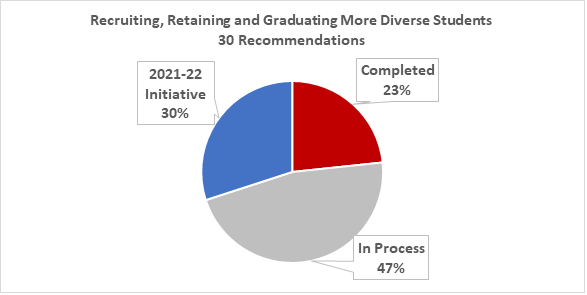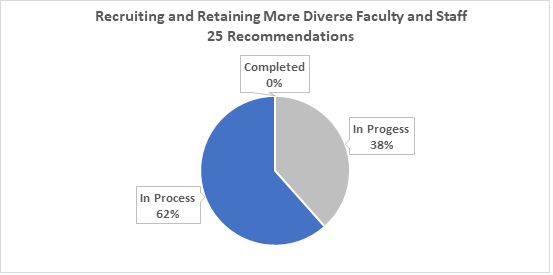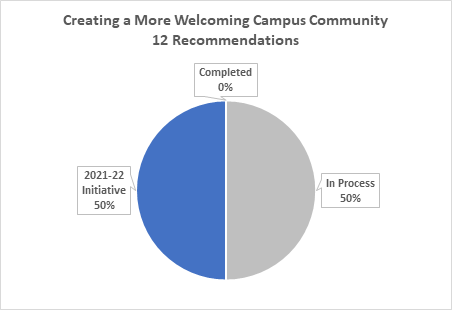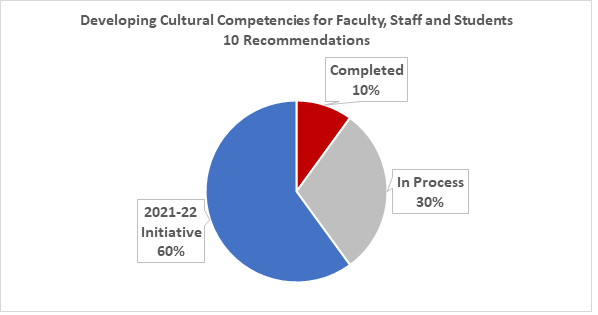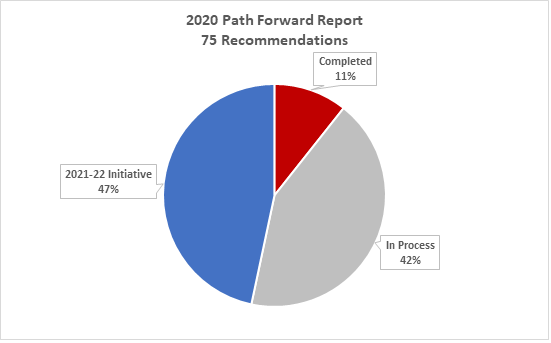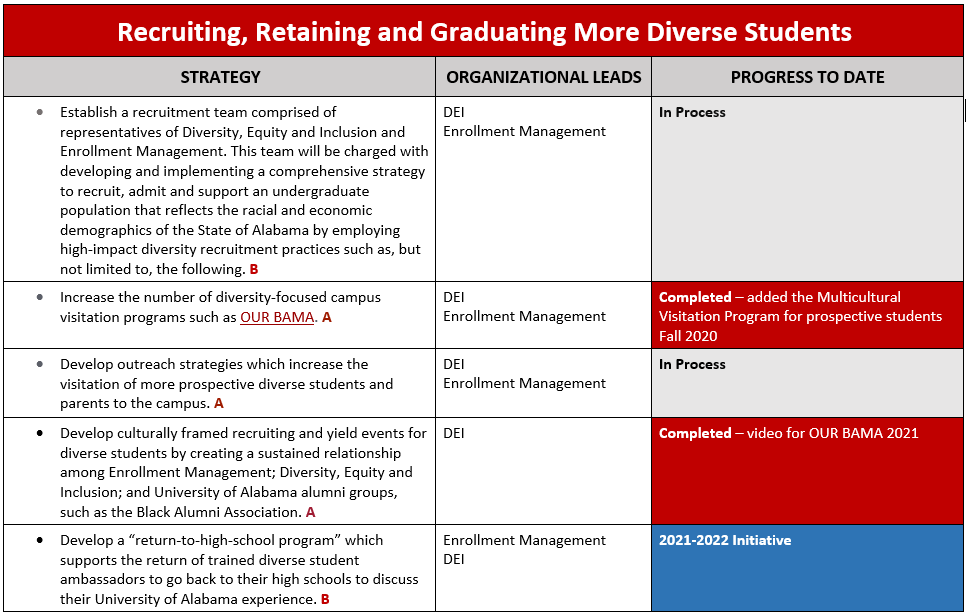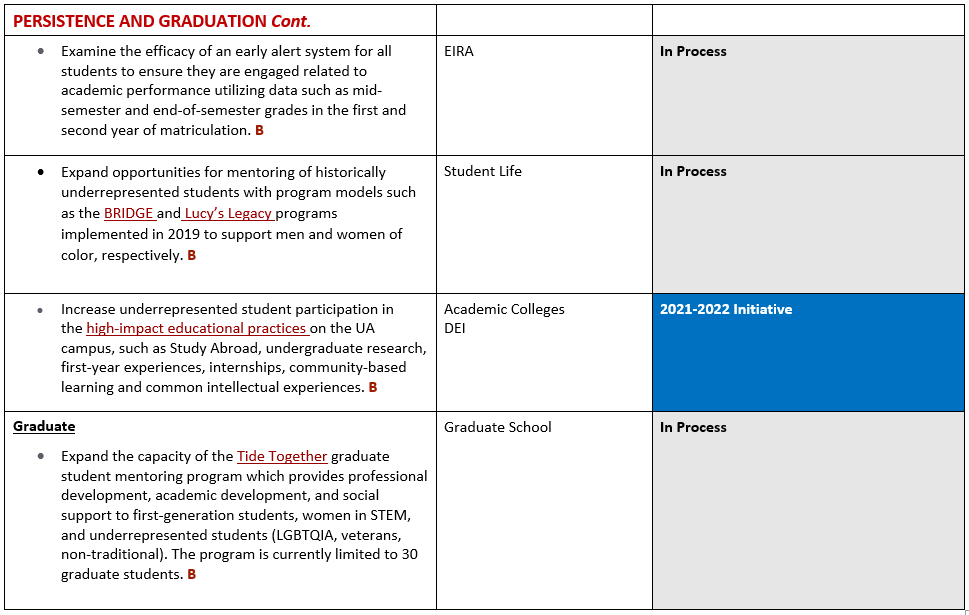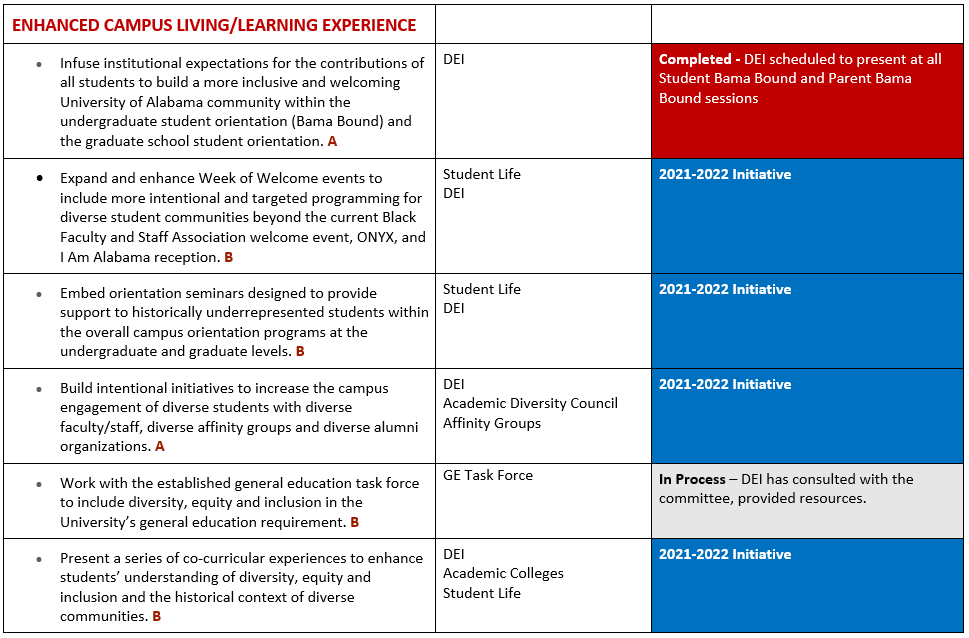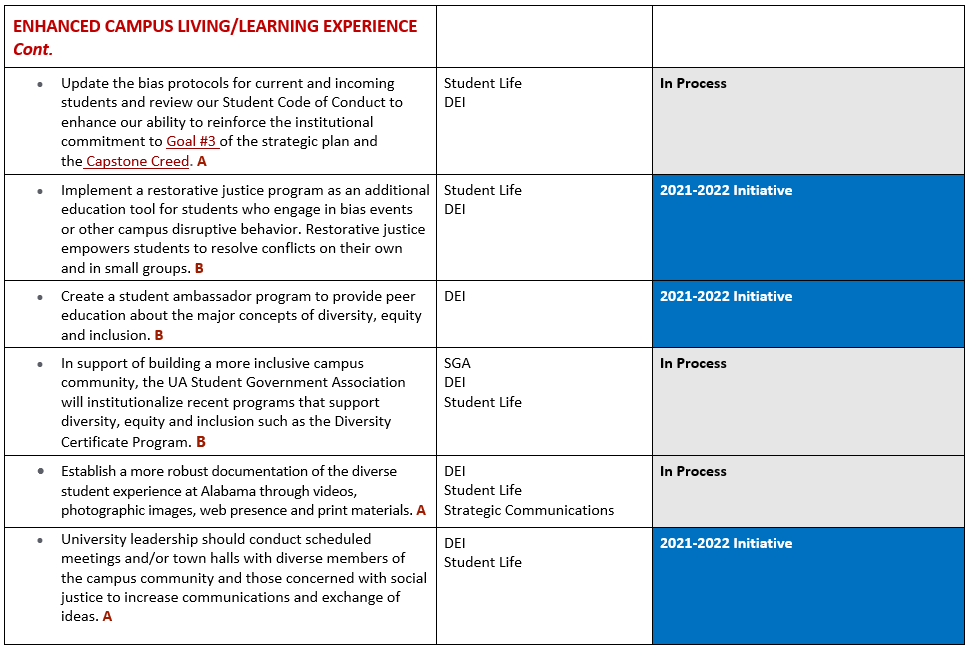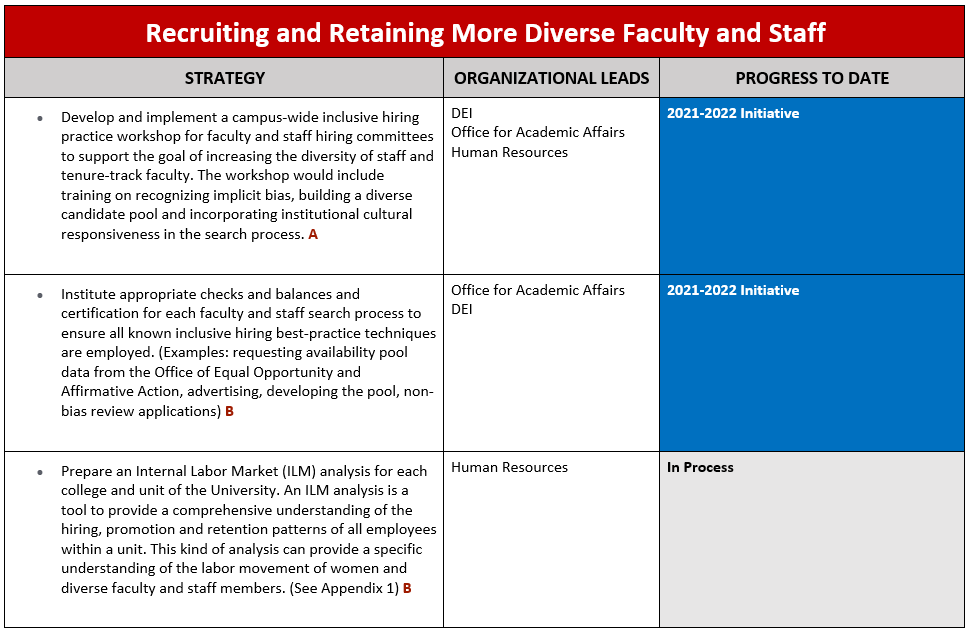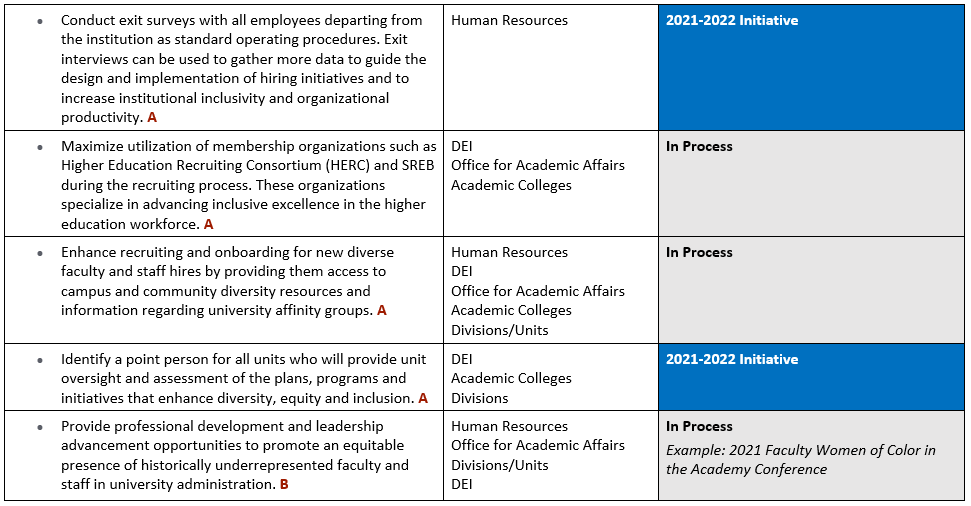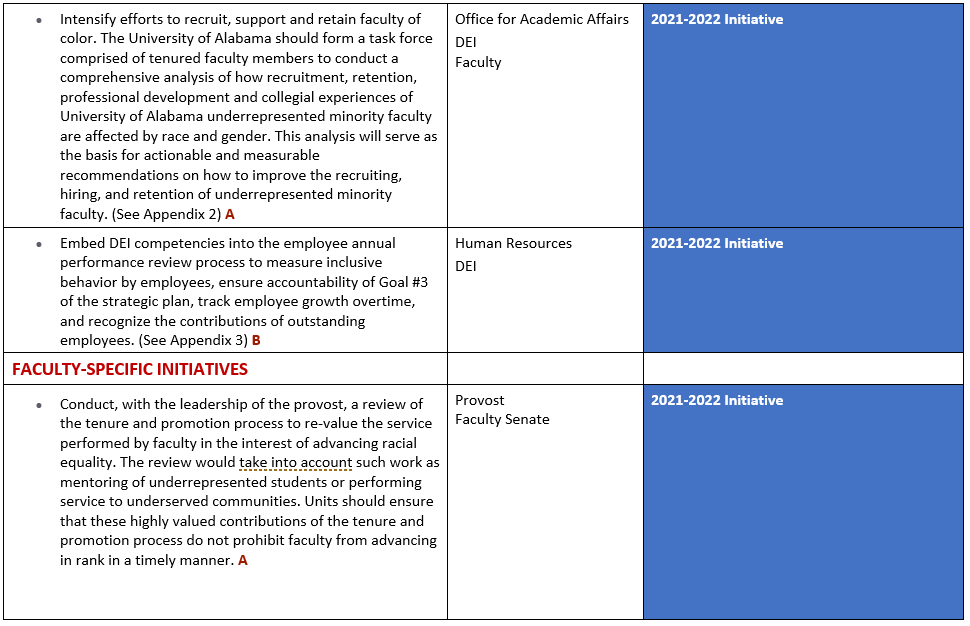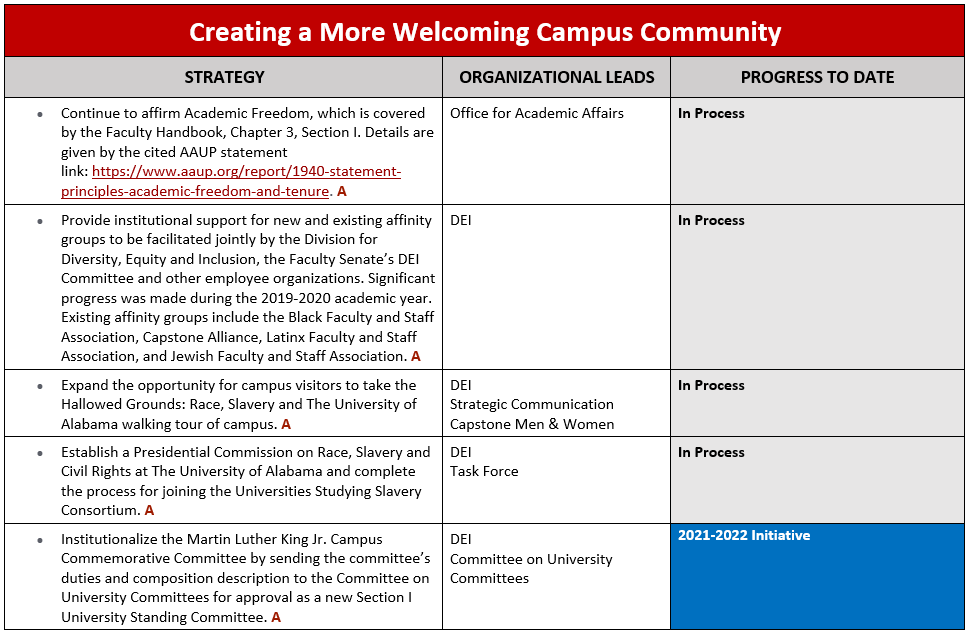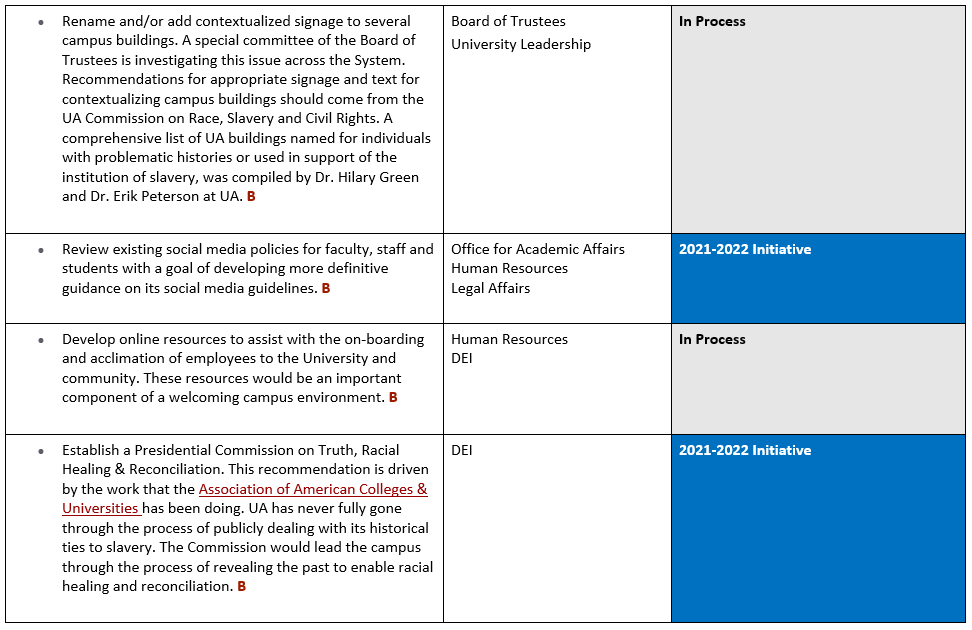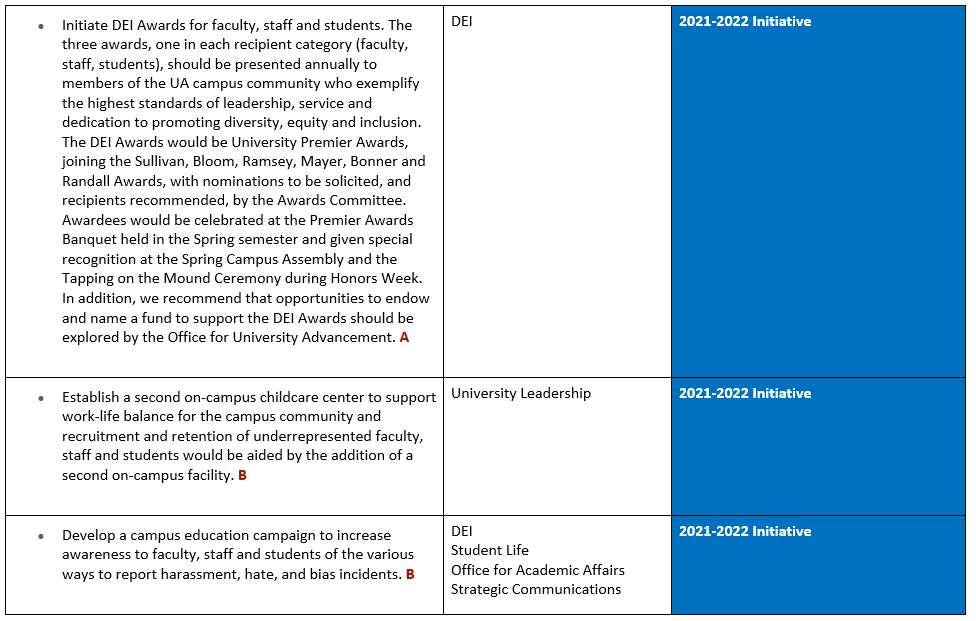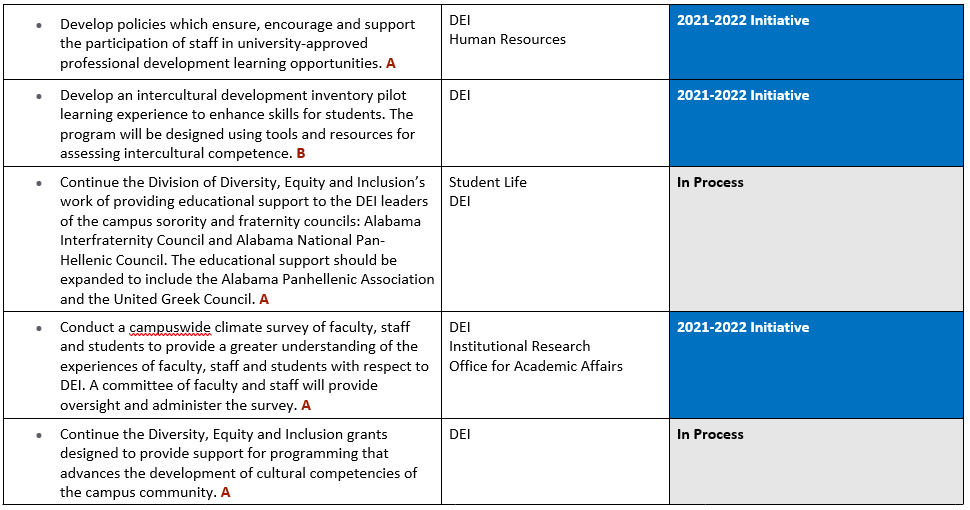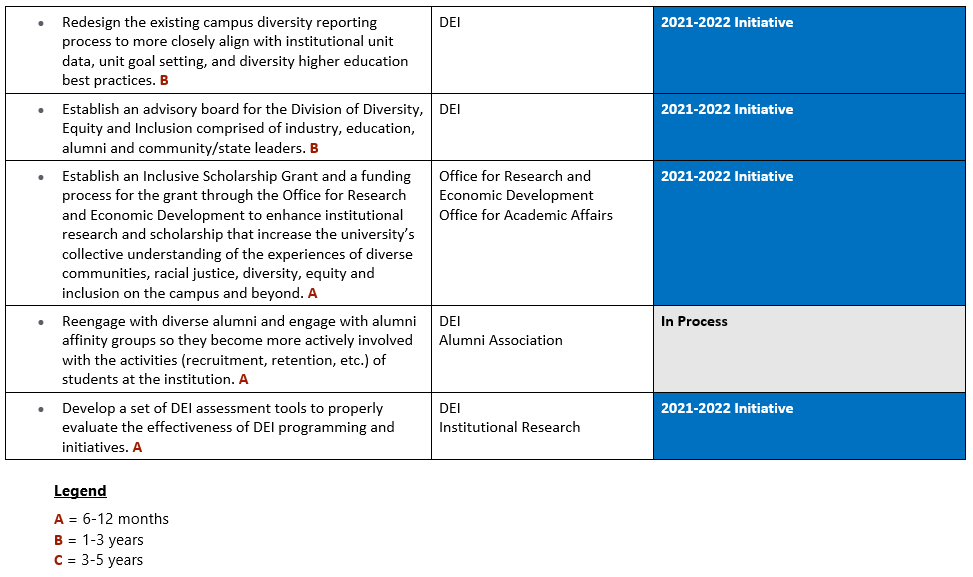Path Forward Progress Update
The Path Forward Plan and subsequent actions build toward the Association of American Colleges and Universities’ culture of inclusive excellence, which requires “the recognition that a community or institution’s success is dependent on how well it values, engages and includes the rich diversity of students, staff, faculty, administrators, and alumni constituents.” I believe the collective actions of our campus community are moving us forward.
The 2020 Path Forward Plan includes a total of 75 strategies each assigned to one of the five over-arching goals for the diversity, equity and inclusion work on our campus.
- This update indicates the status of each strategy: completed, in-process, or to become a 2021-22 initiative.
- An update for each section includes highlighted examples.
- Finally, this document assigns a progress update for each strategy.
Dr. G. Christine Taylor
Vice President and Associate Provost
Division of Diversity, Equity and Inclusion
The University of Alabama
Recruiting, Retaining and Graduating More Diverse Students
Diversity enriches the educational experience. We learn from those whose experiences, beliefs, and perspectives are different from our own, and these lessons can be taught best in a richly diverse intellectual and social environment. It promotes personal growth-and a healthy society.
Diversity challenges stereotyped preconceptions; it encourages critical thinking; and it helps students learn to communicate effectively with people of varied backgrounds.
It strengthens communities and the workplace. Education within a diverse setting prepares students to become good citizens in an increasingly complex, pluralistic society; it fosters mutual respect and teamwork; and it helps build communities whose members are judged by the quality of their character and their contributions.
It enhances America’s economic competitiveness. Sustaining the nation’s prosperity in the 21st century requires us to make effective use of the talents and abilities of all our citizens, in work settings that bring together individuals from diverse backgrounds and cultures.
American Council for Education Board of Directors, 2012
Key Outcomes
- MVP – Working collaboratively with Enrollment Management and the Academic Diversity Council, DEI hosted the first Multicultural Visitation Program (MVP) for prospective diverse students in October 2020. This program is similar to other visitation days, but the program content is purposely designed to show and experience UA through a diversity lens. (While a common practice at many institutions it was a first for The University of Alabama.)
- OUR BAMA – Hosted OUR BAMA, a multicultural yield event for admitted diverse students and their parents on March 20, 2021.
- Retention Team – Established the Equity in Retention Academy (EIRA) team, composed of representatives from the Office for Academic Affairs, Student Life, Academic Success, Institutional Research, Faculty and DEI. This team completed the Gardner Institute’s Equity in Retention Academy, which focused on closing existing equity gaps in student performance with a focus on Pell-eligible students and historically underrepresented students. The team is in process and currently meeting.
- DEI – Intentionally engaged diverse faculty, staff and students in student recruiting events.
- DEI – Worked collaboratively with Strategic Communications to increase university video and photographic images of diverse students, faculty and staff on campus. View the Our Bama video
Recruiting and Retaining More Diverse Faculty and Staff
The diversity of college and university faculties has been a subject of discussion, debate, and priority for several decades—particularly since the 1960s, when equity in higher education became a national priority as a result of the civil rights movement. Despite these discussions and the subsequent launching of several local and national programs to advance faculty diversity, the national report card on accomplishments remains unacceptably poor. All students are better educated and better prepared for leadership, citizenship, and professional competitiveness in multicultural America and the global community when they are exposed to diverse perspectives in their classrooms—a view that comprised a good portion of the social science foundation that undergirded the University of Michigan’s argument in support of affirmative action before the U.S. Supreme Court (Bollinger 2007).
AACU, Peer Review 2010
Key Outcomes
During the past academic year, there have been few opportunities to hire new employees. However, we have focused our energies on building the institutional infrastructure that will positively impact our search and hiring procedures.
- DEI participates in and consults on the HR Reimagined Project.
- DEI provides institutional representation as a Southeast chapter representative to the Higher Education Recruitment Consortium (HERC), which works to advance inclusive excellence in the higher education workforce.
- The University of Alabama provided support for 26 diverse women faculty and staff to attend the 9th Annual Faculty Women of Color in the Academy Virtual Conference.
UA Faculty/Staff Conference Feedback
- It was a positive experience and very beneficial. The most important benefit was the community, being able to interact with other academic women of color. It was a moment to exhale and recharge.
- It was an inspiring, empowering, and invigorating experience. I gained so much knowledge and perspectives that will be useful for serving students who belong to marginalized group. I will incorporate such understanding in helping students in my practice through counseling and outreach.
- As a mid-career faculty/researcher, the conference made me self-reflect on my goals and future directions not just as a faculty/researcher but also as a woman of color in academia. I also obtained information on many useful tools that I could immediately use to further promote my career success in academia.
- Excellent – it should be required for assistant professors to attend.
Reclaiming and Reframing DEI at UA
- Participation in the FWCA conference as a sponsoring institution allowed The University of Alabama to place targeted messaging which was bannered during the conference and placed in printed conference materials. Virtual conference participants included more than 350 women of color including administrators, faculty, deans, and university presidents. This targeted ad was strategically designed as a part of our efforts to “reclaim and reframe” the public narrative of DEI at The University of Alabama. View ad
Creating a More Welcoming Campus Community
Creating a welcoming campus community requires proactive measures. Inclusive campuses provide a sense of belonging for all community members through the acknowledgement of their presence and is evidenced by inclusive practices, policies, communication strategies, and institutional responsiveness.
G. Christine Taylor, Ph.D.
Key Outcomes
- During the COVID pandemic the campus welcomed the opening of the new Intercultural Diversity Center in September 2020. The IDC, now centrally located in the Ferguson Center, serves as a space for students, faculty and staff to engage in cultural learning, cultural teaching and cultural sharing. The center serves as a major programming area for diversity and inclusion on campus and is also the hub for programming in the Division of Diversity, Equity and Inclusion.
- The information below covers a six-month period (September 2020–March 2021).
- Number of people who visited the Intercultural Diversity Center (as of 4/12):1,392
- Commemorative Month Exhibits: (8) 700| attendees
- Presentations in the Intercultural Diversity Center: (12) 225 attendees
- Community Building – Watch Party Series: (4) 153 attendees
- Social Justice Movie Series: (11) 670 attendees
- Diversity, Coffee & Conversations: 3 sessions, 86 attendees
- Safe Zone Rainbow Connections: 12 sessions, 360 attendees
- Safe Zone Lavender Graduation: 50 attendees
- Virtual Cooking Demonstrations: (3) 239 attendees
- Program partnerships with other departments and student organizations: 86
Developing Cultural Competencies for Faculty, Staff and Students
Cultural competence refers to an ability to interact effectively with people of different cultures. Cultural competence comprises four components: (a) Awareness of one’s own cultural worldview, (b) Attitude towards cultural differences, (c) Knowledge of different cultural practices and worldviews, and (d) cross-cultural skills. Developing cultural competence results in an ability to understand, communicate with, and effectively interact with people across cultures.
Culturally Proficient Leadership, R. Terrell et al
Key Outcomes
- Use of the Zoom platform and partnering with our sister institutions allowed the campus to increase the quantity and quality of professional development opportunities for our faculty, staff and students. The ease of access also resulted in greater campus participation.
- Through virtual lectures, conferences, presentations and webinars, more than 10,000 people have engaged with The University of Alabama Division of Diversity, Equity and Inclusion since May 2020.
- The DEI team provided more than 30 workshops and trainings for university organizations, departments, committees and colleges.
- During the past year, the division offered the following DEI educational opportunities for the campus:
- Educational Webinars: (30) 1,944 attendees
- Commemorative Month Keynote speakers:(6) 5,347 attendees
- Virtual Vigil Against Racialized Violence: 1,533 viewers
- #StopAsianHate Vigil: 119 attendees
- Virtual host of the Alabama Association of Higher Education Diversity Officers Conference, February 2021: 375 participants
- Good Trouble Book Reads (readings and discussions to advance social justice at the Capstone): (4) 272 registrations/participants
- A Pandemic in Our Communities – Health Disparities, Health Inequalities and Possible Solutions daylong conference sponsored by the Southeastern Conference of Chief Diversity Officers
- Faculty-Specific Professional Development Webinars/Resources
- Teaching for Diversity and Inclusion Fall Webinar Series – Fall 2020
- Building Inclusive Classrooms in an Online Environment VIDEO
- Teaching with Tension: A National Election, A Pandemic, State-Sanctioned Violence and Strategies for Talking about Race in Our Current Moment
- Culturally Responsive Teaching in the STEM Classroom and Beyond VIDEO
- Task Force on the Study of Slavery, Race and Civil Rights — Through the task force’s work, The University of Alabama has:
- formally joined the consortium of Universities Studying Slavery (USS),
- begun to establish a project web presence,
- presented three teach-ins for our campus during 2020-21, and
- accomplished the following for the 2020-21 academic year:
- October 2020: “What Would John Lewis Do? Vote!” – UA faculty panel discussion covering the evolution of voting in America, how the electoral college works and media and election coverage. 52 participants
- February 2021: The Half Has Not Been Told – This program focused on civil rights and education with an examination of how racism and white supremacy have defined systemic inequalities in education. 309 participants
- March 2021: The History of Slavery at UA – The presentation focused on the lives and history of enslaved people on campus and early Christian organization among enslaved and formerly enslaved people in Tuscaloosa. 155 participants
Expanding Diversity, Equity and Inclusion Infrastructure
“We are now faced with the fact that tomorrow is today. We are confronted with the fierce urgency of now. In this unfolding conundrum of life and history, there ‘is’ such a thing as being too late. This is no time for apathy or complacency. This is a time for vigorous and positive action.”
Dr. Martin Luther King, Jr.
Key Outcomes
-
-
- The search process is underway for a director of the Safe Zone Resource Center. This position will provide professional direction for the center and support for students, faculty and staff who are members of the LGBTQIA+ community and their allies.
- DEI has established formal engagement with diverse alumni groups (Capstone Alliance and Black Alumni Association) identifying impactful ways to re-engage with the campus.
- The division has increased multimedia outreach to campus and community partners about the work of DEI at the University.
-
2020 Path Forward Report Update
According to EAB, four key components are required of a strong DEI plan – definition, creation, facilitation, and communication. Specifically, the plan must:
-
-
- Define a campus-specific vocabulary and vision;
- Create achievable goals through action items;
- Facilitate follow-through; and
- Communicate transparency on progress.
-
We will continue to follow the model provided by EAB and other national best practices.

